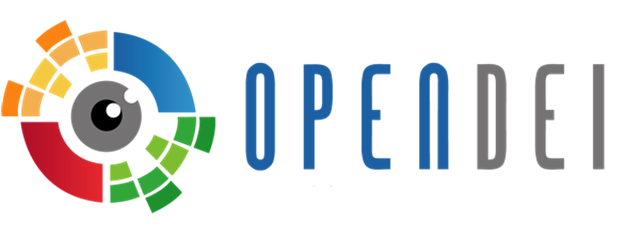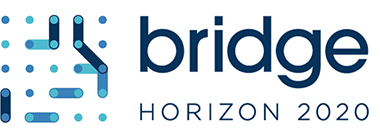The Platone consortium had an excellent starting point to connect to intermediaries and for cooperation due to its well-established collaboration network in Europe, with contacts to many key players of the depicted target audience and partners involved in industry associations, standardization, European energy governance and research networks as well as having an active role in other H2020 projects or initiatives.
Contribution to european joint RDI efforts
Three joint Research, Development and Innovation (RDI) efforts played an important role for the Platone project:
The European Commission initiative BRIDGE united Horizon 2020 Smart Grid and Energy Storage Projects. The aim of BRIDGE was to bring these projects together to create a structured view of cross-cutting issues, which were encountered in the demonstration projects and could have constituted an obstacle for innovation. Four working groups "Data management”, "Business models”, "Regulations” and "Customer Engagement” represented the main areas of interest as well as the three task forces "Energy Communities”, "Replicability/Scalability Analysis” and "Joint Communication”. Since the beginning of BRIDGE, numerous projects have had the opportunity to join and participate in the discussions to develop strong analysis and build reports that supported the elaboration of EU directives.
ETIP SNET, the European Technology and Innovation Platform Smart Networks for Energy Transition, united a multitude of stakeholders and experts from the energy sector. It provided input to the Strategic Energy Technology Plan (SET Plan) action 4 which addressed the technical challenges raised by the transformation of the energy system. There were five working groups and the National Stakeholder Coordination Group (NSCG).
OPEN DEI was a H2020 project for aligning Reference Architectures, Open Platforms and Large-Scale Pilots in Digitising European Industry. It aimed at leveraging synergies, identifying gaps, sharing best practices, reinforcing regional or national relationships as well as putting in place the necessary joint measures to implement common dissemination, communication, training and exploitation action plans among the Innovation Actions (IA) selected projects and their Large-Scale Pilots (LSPs). OPEN DEI has created several Working Groups related to specific topics to serve the interest of the involved projects such as Platone.
Several partners of the Platone project were actively involved in the activities of BRIDGE, ETIP SNET and OPEN DEI. These synergies ensured that the main findings of the project were transferred in the documents that were elaborated in the future activities of BRIDGE working groups and ETIP SNET white papers, roadmaps and implementation plans. Platone contributed to the activities of the BRIDGE working groups, contributed to the updates of the existing BRIDGE documents and provided input for the upcoming deliverables that will be drafted. Links were also established with representatives of the ETIP SNET working groups and members of the project contributing to the activities of the different ETIP SNET working groups. In the context of OPEN DEI the active participation of Platone partners allowed continuous exchange
of the best practices with other projects focused on digitalisation and
put in place the necessary joint measures to implement common
dissemination and communication.
International Cooperation: Canada
Platone has established a cooperation with the Distributed Energy Management Initiative (DEMI) in Canada, a partnership between Northern Alberta Institute of Technology (NAIT), ATCO, Siemens and the Future Energy Systems research programme at the University of Alberta. It was facilitated by the strategic alliance between RWTH and University of Alberta and by the fact that SIEMENS was partner in Platone as well as in DEMI.
The cooperation created added value on both sides: The Canadians extended the set of Platone use case scenarios to microgrid flexibility. In general, the uptake from the Canadians of data developed in Platone remains of key importance. The University of Alberta has brought up the Platone approach in the project "Towards future interconnected electric system”, funded in Alliance Grant of the Natural Sciences and Engineering Research Council of Canada (NSERC), the major federal agency responsible for funding natural sciences and engineering research in Canada and NAIT. The testing area was a microgrid within the Centre for Grid Innovation (CGI), which was initiated by DEMI 2018 and is located at NAIT. In this "plug-and-play”, microgrid energy companies could develop, test and validate their technologies under realistic field conditions. For this purpose, representatives of the Canadian research group were included in the Platone Advisory and Dissemination Board (ADB). Furthermore, Platone project coordinator RWTH University of Aachen and the University of Alberta defined a set of coordinated Ph.D. Theses on topics connected to the Platone project.
In November 2020, a first joint workshop between Platone and the University of Alberta was organised. Special focus was the role of the Platone architecture. The University of Alberta took an active role on this aspect from many perspectives:
- Replica of the platform on the Canadian site;
- Networking with relevant stakeholders (particularly DSOs) for an adoption of the solution;
- Direct involvement in the Linux Foundation Energy working group that is supervising the development of the platform for the long term.
In July 2022 a second joint workshop took place. Insights from the Platone work package on the topic of "Scalability, Replicability and Cost-Benefit-Analysis” were in the focus this time. Platone consortium partner RSE and NTUA presented their work .
Together with Dr. Petr Musilek, the Canadian coordinator, Platone has elaborated a questionnaire to share with all involved persons to further pave the path for a replication of Platone data in the Canadian approach.
Closely before, Prof. Monti was invited to make a presentation to the industrial partners of the University of Alberta, the Alberta Power Industry Consortium (APIC) in May 2022.


